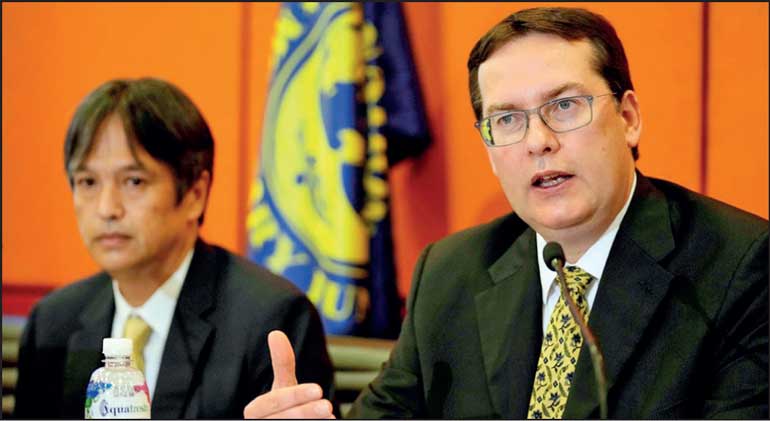Tuesday Feb 17, 2026
Tuesday Feb 17, 2026
Wednesday, 22 March 2023 01:35 - - {{hitsCtrl.values.hits}}

IMF’s Senior Mission Chief for Sri Lanka Peter Breuer (right) with Country Mission Chief for Sri Lanka Masahiro Nozaki - File photo
By Nisthar Cassim
The International Monetary Fund (IMF) on Monday described Sri Lanka’s recent past strategy as a “brutal experiment” and dismissed the notion that the multilateral donor agency was the force behind tough austerity measures.
“We understand the hardships faced by the people. It is due to the crisis and the IMF is there to lesson a bit but the adjustment will be a harsh one,” Breuer said responding to widespread misconception.
The IMF has been accused of imposing wide scale austerity measures but IMF’s Senior Mission Chief for Sri Lanka Peter Breuer told journalists that over the past one year or at the start of the crisis there has been no IMF support.
“It starts only from today. That has just shown what a brutal experiment it is to have to adjust the economy from one equilibrium to the other without any external support. No one is willing to finance the big gap between the expenditures and revenues of the Government,” the IMF official told journalists at an online briefing out of Washington DC following the approval of $ 2.9 billion four-year Extended Fund Facility program. Widely considered as a lifeline for bankrupt Sri Lanka.
He recalled that in 2021 revenue was 8.6% of GDP, expenditure was 19.9% of GDP and in the past the Governments have been able to finance that with borrowings.
“At the moment no one is willing to cover that gap hence the adjustment is very brutal. The Government has to raise its revenue very quickly and CBSL has been printing money which has been fuelling inflation, it is one of the bluntest tools a country has which is particularly bad for the poor,” Breuer said.
He explained that what the IMF does are two things - first is it supports the authorities in adjusting their policies to correct these imbalances and it provides some financing and cushions these adjustments that allows the adjustments to take a little more time than it would if there is no external support. By catalysing additional support from other bilateral creditors this cushion gets a little bit bigger.
He also said that Sri Lanka collects the least amount of Government revenue in the world. “Tax revenue has to be increased but in a growth friendly manner and with adequate safeguards to the most vulnerable. Reforms will help regain the confidence of creditors,” he added.
